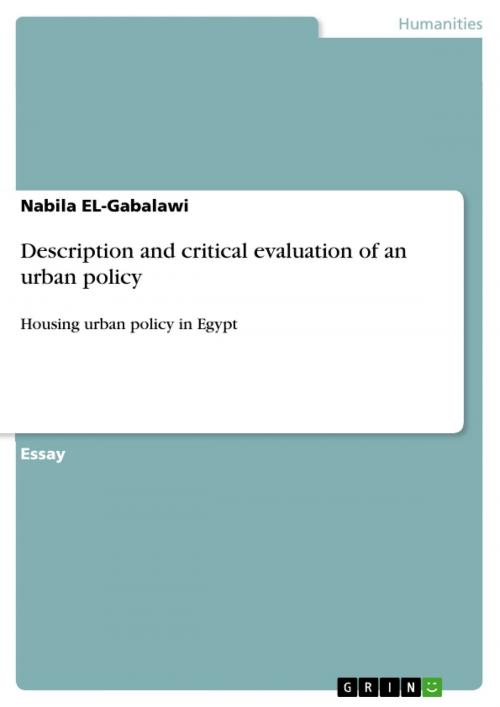Description and critical evaluation of an urban policy
Housing urban policy in Egypt
Nonfiction, Social & Cultural Studies, Social Science| Author: | Nabila EL-Gabalawi | ISBN: | 9783640721153 |
| Publisher: | GRIN Publishing | Publication: | October 12, 2010 |
| Imprint: | GRIN Publishing | Language: | English |
| Author: | Nabila EL-Gabalawi |
| ISBN: | 9783640721153 |
| Publisher: | GRIN Publishing |
| Publication: | October 12, 2010 |
| Imprint: | GRIN Publishing |
| Language: | English |
Essay from the year 2008 in the subject Sociology - Habitation, Urban Sociology, grade: B, University of Birmingham (International Development Department), course: Urban Development, language: English, abstract: Setting up a policy to fill in a certain gap is not an easy task and to develop a policy for addressing the housing problems especially for the poor is the most difficult one. This assumption aroused from the fact that any housing policy does not relate to housing by itself only but also associated with addressing the socio-economic changes that created unbalanced wealth distribution among the different categories within the country. In Egypt the problem of housing provision for low-income groups is really challenging because of the uncontrolled population and urban growth. The Egyptian Government has the good intention to respond to the needs of the poor, as the Government announced through its National Housing Project to 'provide a shelter for every citizen' for that purpose it has initiated different housing schemes to solve the problem of housing provision all over Egypt especially for youth and low-income groups, but when it comes to reality, this target seems to be far ahead to be achieved. On the other hand, some of the latest Government trials proved to be successful as it managed to provide large number of beneficiaries with a healthy shelter, with affordable price that matches with their actual needs. In order to make the Egyptian housing policy for the poor more effective, different legislative and regulatory complications should be tackled and more participatory approaches should be adopted in order to understand what are the actual needs of the poor, and hence to be more responsive to them.
Essay from the year 2008 in the subject Sociology - Habitation, Urban Sociology, grade: B, University of Birmingham (International Development Department), course: Urban Development, language: English, abstract: Setting up a policy to fill in a certain gap is not an easy task and to develop a policy for addressing the housing problems especially for the poor is the most difficult one. This assumption aroused from the fact that any housing policy does not relate to housing by itself only but also associated with addressing the socio-economic changes that created unbalanced wealth distribution among the different categories within the country. In Egypt the problem of housing provision for low-income groups is really challenging because of the uncontrolled population and urban growth. The Egyptian Government has the good intention to respond to the needs of the poor, as the Government announced through its National Housing Project to 'provide a shelter for every citizen' for that purpose it has initiated different housing schemes to solve the problem of housing provision all over Egypt especially for youth and low-income groups, but when it comes to reality, this target seems to be far ahead to be achieved. On the other hand, some of the latest Government trials proved to be successful as it managed to provide large number of beneficiaries with a healthy shelter, with affordable price that matches with their actual needs. In order to make the Egyptian housing policy for the poor more effective, different legislative and regulatory complications should be tackled and more participatory approaches should be adopted in order to understand what are the actual needs of the poor, and hence to be more responsive to them.















